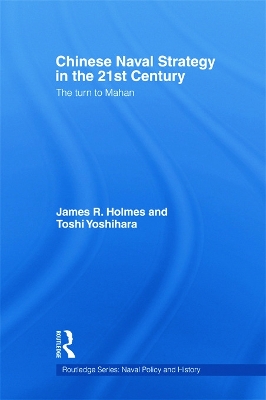Cass Series: Naval Policy and History
2 total works
Chinese Naval Strategy in the 21st Century
by James R. Holmes and Toshi Yoshihara
Alfred Thayer Mahan has been called America's nineteenth-century 'evangelist of sea power' and the intellectual father of the modern US Navy. His theories have a timeless appeal, and Chinese analysts now routinely invoke Mahan's writings, exhorting their nation to build a powerful navy.
Economics is the prime motivation for maritime reorientation, and securing the sea lanes that convey foreign energy supplies and other commodities now ranks near or at the top of China's list of military priorities. This book is the first systematic effort to test the interplay between Western military thought and Chinese strategic traditions vis-a-vis the nautical arena. It uncovers some universal axioms about how theories of sea power influence the behaviour of great powers and examines how Mahanian thought could shape China's encounters on the high seas. Empirical analysis adds a new dimension to the current debate over China's 'rise' and its importance for international relations. The findings also clarify the possible implications of China's maritime rise for the United States, and illuminate how the two powers can manage their bilateral interactions on the high seas.
Chinese Naval Strategy in the 21st Century will be of much interest to students of naval history, Chinese politics and security studies.
Indian Naval Strategy in the Twenty-first Century
by James R. Holmes, Andrew C. Winner, and Toshi Yoshihara
This is the first academic study of India's emerging maritime strategy, and offers a systematic analysis of the interplay between Western military thought and Indian maritime traditions.
By a quirk of historical fate, Europe embarked on its Age of Discovery just as the main Asian powers were renouncing the sea, ushering in centuries of Western dominance. In the 21st century, however, Asian states are once again resuming a naval focus, with both China and India dedicating some of their new-found wealth to building powerful navies and coast guards, and drawing up maritime strategies to govern the use of these forces. The United States, like the British Empire before it, is attempting to manage these rising sea powers while preserving its maritime primacy.
This book probes how India looks at the sea, what kind of strategy and seagoing forces New Delhi may craft in the coming years, and how Indian leaders may use these forces. It examines the material dimension, but its major premise is that navies represent a physical expression of a society's history, philosophical traditions, and culture. This book, then, ventures a comprehensive appraisal of Indian maritime strategy.
This book will be of interest to students of sea power, strategic studies, Indian politics and Asian Studies in general.
James R. Holmes is an Associate Professor of Strategy at the U.S. Naval War College and a former U.S. Navy surface warfare officer. Toshi Yoshihara is an Associate Professor in the Strategy and Policy Department at the Naval War College. Andrew C. Winner is Professor in the Strategic Research Department at the U.S. Naval War College.

